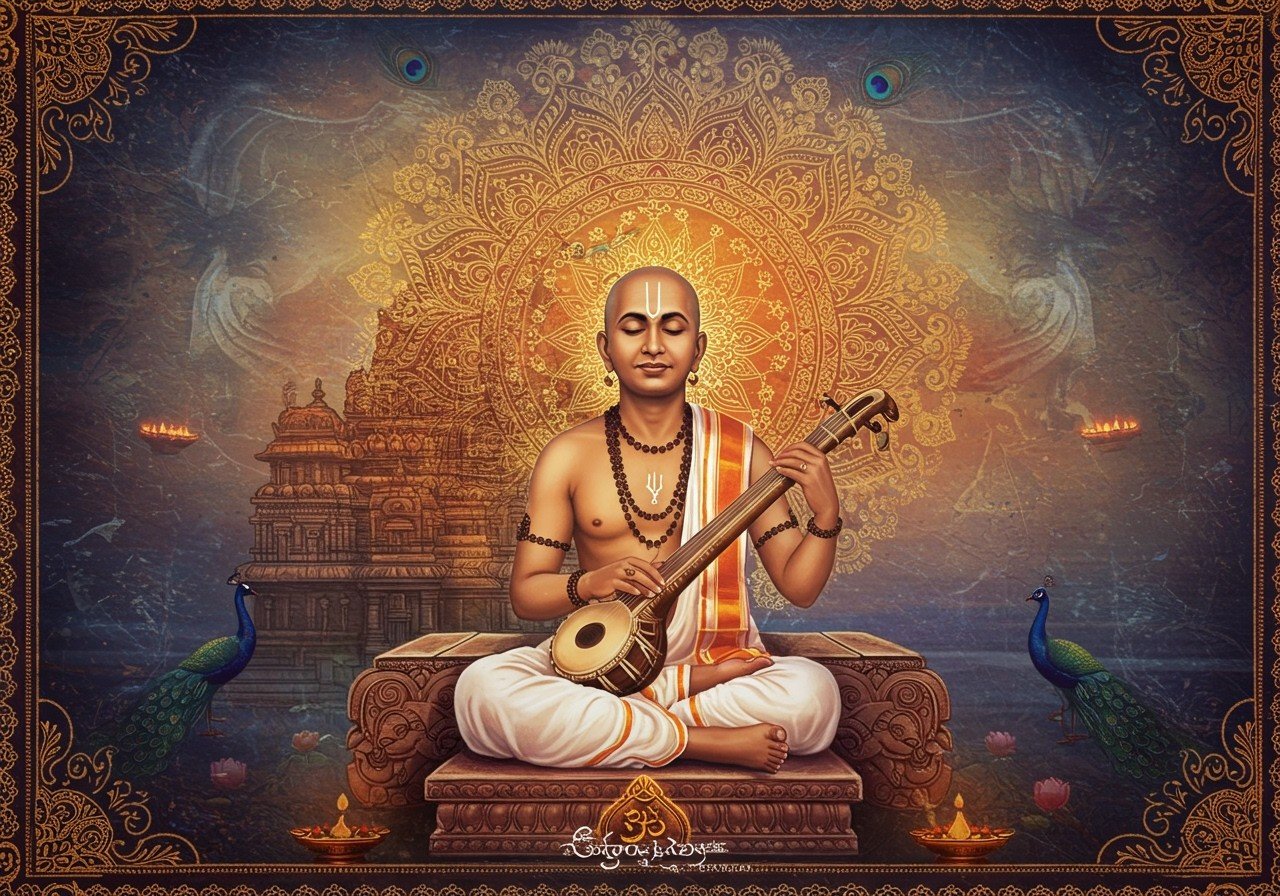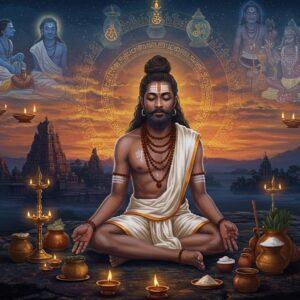
Kanaka Dasa (1509–1606), a revered saint, poet, philosopher, and devotee of Lord Krishna, left an indelible mark on Indian spirituality and social reform. Born in Karnataka, India, his life and works continue to inspire millions with their profound messages of devotion, equality, and social justice. He was a follower of Madhvacharya’s Dvaita Vedanta philosophy and a disciple of Vyasatirtha.
Kanaka Dasa’s Early Life and Transformation
Born as Thimmappa Nayaka into a warrior family, Kanaka Dasa’s life took a dramatic turn towards spiritual enlightenment. His transformation from warrior to devout follower of Lord Krishna exemplifies the power of the Bhakti movement. He embraced the Haridasa tradition, known for its emphasis on inclusivity and equality, and his pilgrimage to Udupi solidified his deep devotion to Krishna. His adopted name, “Kanaka Dasa,” meaning “servant of gold,” symbolizes the purity of his devotion.
The Essence of Kanaka Dasa’s Philosophy
Kanaka Dasa’s philosophy centers on devotion (bhakti) as the primary path to spiritual liberation. He stressed the importance of inner purity and a direct connection with the divine, emphasizing that true devotion transcends ritualistic practices. Deeply influenced by Madhvacharya’s Dvaita Vedanta philosophy, which emphasizes the distinct nature of the individual soul (Atman) and the supreme soul (Brahman), Kanaka Dasa’s teachings resonate with the core principles of Bhakti. His works boldly challenged the rigid caste system prevalent in his time, advocating for a society based on equality and social justice. He believed that everyone, regardless of social background, could attain salvation through sincere devotion. His philosophy also emphasized the importance of realizing God within oneself.
- Dvaita Vedanta: Kanakadasa’s philosophical foundation was rooted in Madhvacharya’s Dvaita Vedanta, a philosophy that emphasizes the eternal distinction between the individual soul and the Supreme Being, Lord Vishnu. This duality, he believed, was crucial to understanding the true nature of devotion and liberation.
- Devotion and Equality: His music and poetry, primarily in Kannada, became powerful tools for promoting love, equality, and devotion among all people, irrespective of their caste or social status. He believed that sincere devotion was the key to spiritual liberation, accessible to all who sought it with a pure heart.
- Critique of the Caste System: Kanakadasa fearlessly challenged the prevailing social injustices of his time, particularly the rigid caste system, emphasizing inner purity and devotion over social hierarchy. He argued that true wisdom and humility are essential for spiritual liberation and that salvation is unattainable as long as ego and societal prejudices cloud one’s heart.
- Realizing God Within: Kanakadasa’s teachings encouraged individuals to seek God within themselves, urging them to worship, adore, and appease God with sincere love and devotion. He believed that true spiritual growth stemmed from an internal transformation, fostering a deep connection with the divine within.
The Wisdom of Kanaka Dasa’s Quotes
Kanaka Dasa’s quotes are renowned for their profound spiritual insights. “Kula kula kula vennutihudu, kula kula kula endu badukadiri” critiques the futility of caste distinctions. “Nanu hodare hodenu, nana kaadu hodare hodenu” encourages detachment from material possessions. “Nimma bhaktiya daariyalli, nimma naama sahavasa” underscores the importance of devotion and the divine name. These timeless words continue to guide seekers on the path of love, humility, and spiritual understanding.
Kanaka Dasa’s Literary Legacy: Vachanas and Beyond
Kanaka Dasa’s vachanas, short poetic compositions in Kannada, are treasured for their accessibility and spiritual depth. They convey complex philosophical concepts in simple language, making them relatable to people from all walks of life. The vachanas explore themes of devotion, morality, and social justice, urging listeners to reflect on the impermanence of worldly pursuits and embrace a virtuous life. His other literary contributions include keertanas, ugabhogas, and philosophical treatises. ‘Mohana Tarangini’, his magnum opus, narrates the life of Krishna in a captivating poetic style. His works have profoundly shaped Kannada literature, leaving an enduring legacy for generations of poets and spiritual seekers. Through his music and verse, Kanaka Dasa’s sahitya serves as both spiritual education and a testament to the rich cultural heritage of Karnataka.
Poojn.in: Supporting Your Spiritual Journey
At Poojn.in, we offer a wide selection of authentic puja items to support your spiritual practices. Discover high-quality products like Pure Brass Diya Sets, Tulsi Malas, Sandalwood Powder, Puja Thali Sets, and Incense Sticks, all crafted to enhance your connection with the divine. Visit https://www.poojn.in/product-category/pooja-samagri to explore our complete collection and enrich your spiritual journey. You can also explore other related products on https://www.poojn.in/product-category/low-value-products and https://www.poojn.in/product-category/brands
Embracing Kanaka Dasa’s Timeless Wisdom
Kanaka Dasa’s teachings continue to resonate in our modern world, reminding us of the power of love, equality, and devotion. His life story, marked by a profound transformation from warrior to saint, inspires us to seek spiritual growth through humility and inner purity. By embracing his timeless wisdom, we honor our rich cultural heritage and contribute to a society built on compassion and unity.
Exploring Kanaka Dasa’s Philosophy: FAQs
Who was Kanaka Dasa? Kanaka Dasa (1509-1606) was a highly revered Bhakti saint, poet, philosopher, and musician from Karnataka, India, known for his profound devotion to Lord Krishna. His teachings emphasized devotion, equality, and the accessibility of spiritual liberation to all, regardless of social background.
What are some famous quotes by Kanaka Dasa? His quotes, often imbued with deep spiritual meaning, continue to inspire countless individuals. Many find solace and guidance in his words on humility, faith, and the pursuit of a pure heart. They provide valuable insights into his philosophy and the essence of Bhakti.
What are Kanaka Dasa Vachanas? Kanaka Dasa Vachanas are his poetic compositions, written in simple yet powerful language, that convey moral and spiritual messages. These vachanas are easily accessible to people from all walks of life and serve as a valuable resource for understanding his teachings.
Why is Kanaka Dasa’s philosophy important today? His emphasis on equality, devotion, and moral values remains deeply relevant in our modern world. His teachings offer a path towards living with integrity, compassion, and a deep respect for all beings.
How did Kanaka Dasa contribute to Kannada literature? Kanaka Dasa significantly enriched Kannada literature with his devotional poems and songs. His literary works, imbued with spiritual wisdom, have left a lasting impact on Kannada literature and continue to be a source of inspiration.
What is Kanaka Dasa Sahitya? Kanaka Dasa Sahitya refers to the entire body of his literary creations, encompassing songs, poems, and philosophical writings that focus on spirituality and devotion. His Sahitya plays a vital role in religious and cultural traditions.
Where can I find Kanaka Dasa’s works online? Various online platforms and libraries offer access to Kanaka Dasa’s works, providing a valuable resource for those seeking to delve deeper into his spiritual teachings and literary contributions. Many websites feature his poems, songs, and teachings.
Kanaka Durga Temple: Your Complete Guide to Visiting
Kanaka Durga: Significance and Importance in Hindu Mythology
Pooja Samagri for Kanaka Durga: A Complete Guide for All Deities
Kanaka Durga Temple: A Guide to Your Visit


